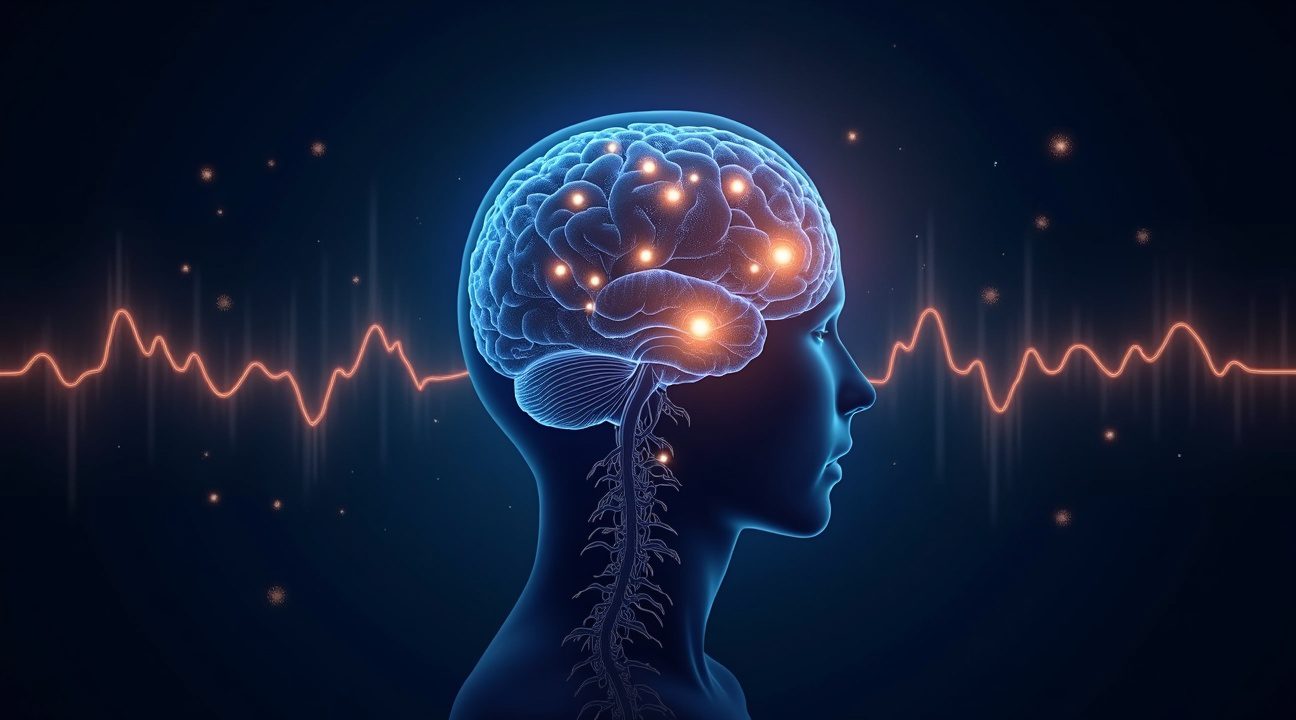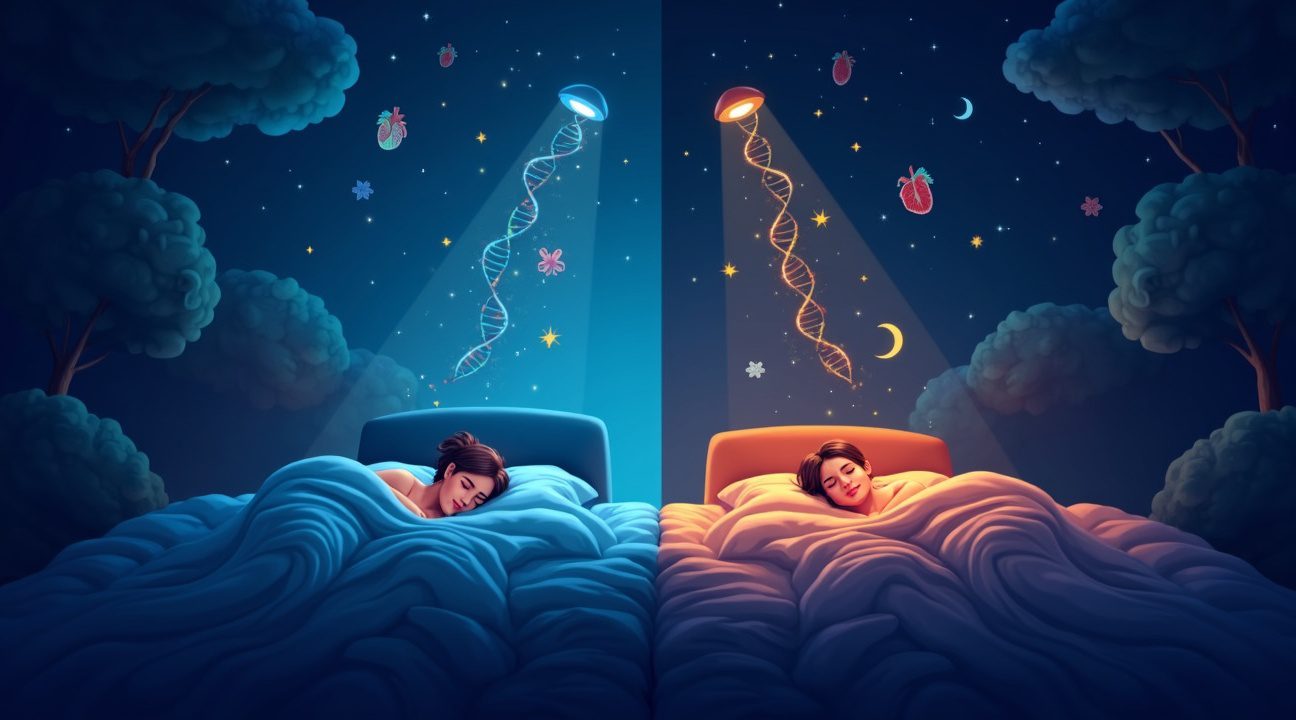Scientists have discovered rare genetic mutations that allow a small subset of individuals to thrive on only 3–4 hours of sleep per night—without experiencing the negative consequences typically associated with sleep deprivation.
Genetic Mutations Behind Natural Short Sleep
Scientists have identified five specific gene mutations—DEC2, SIK3-N783Y, ADRB1, NPSR1, and GRM1—linked to a phenomenon known as “natural short sleep.” These mutations enable the brain to perform essential restorative functions much more efficiently than the average sleep cycle allows, resulting in individuals feeling fully rested after just 3–4 hours of sleep per night.
Key Takeaways
- Genetic mutations enable natural short sleep: The five known variants optimize sleep architecture in ways that allow individuals to get necessary rest in less time.
- Extreme rarity makes this irrelevant for most people: Fewer than 1 in 25,000 people carry these mutations, meaning most people still need 7–9 hours of sleep for health and cognitive function.
- No health consequences for natural short sleepers: Those with these mutations maintain strong immune systems and cognitive abilities despite shorter sleep durations.
- Different brain mechanisms create the same result: Each genetic variant operates uniquely—impacting alertness, sleep efficiency, or neurotransmission.
- Potential medical breakthroughs ahead: Findings may lead to innovative therapies for insomnia, shift work fatigue, or more efficient sleep solutions.
How the Sleep Efficiency Genes Work
Each mutation affects sleep processes in different ways:
- DEC2: Alters circadian rhythm, effectively accelerating the body’s internal clock.
- SIK3-N783Y: Modifies how sleep pressure builds, allowing individuals to awaken fully refreshed after little sleep.
- ADRB1: Affects norepinephrine receptors, sustaining alertness during waking hours without fatigue.
- NPSR1: Changes the neuropeptide S receptor, influencing sleep quality and anxiety regulation.
- GRM1: Impacts glutamate signaling, increasing sleep efficiency while preserving mental agility.
Scientific Observations on Natural Short Sleepers
Studies across affected families over more than a decade have shown that natural short sleepers perform just as well physically, cognitively, and immunologically as those who follow traditional sleep durations. Their brains effectively manage:
- Memory consolidation
- Toxin clearance
- Neural repair and regeneration
New Insights into Brain Activity
Researchers have also noted that certain mutations increase the time spent in slow-wave sleep, or boost the number of sleep spindles—brief bursts of neural activity crucial to learning and memory. These changes suggest that sleep quality matters as much as sleep quantity.
Future Applications in Medicine
The study of these gene mutations goes beyond curiosity. Scientists and pharmaceutical developers are investigating ways to simulate these genetic effects through targeted medications and therapies. Potential future applications include treatments for:
- Insomnia and sleep apnea
- Shift work-related fatigue
- Parenting and caregiving sleep challenges
- Military and emergency professional sleep enhancement
A Word of Caution
Despite the fascination with sleeping less, researchers warn against attempting to reduce sleep without medical necessity or protection from these specific gene variants. Prolonged sleep deprivation can lead to:
- Weakened immune system
- Impaired decision-making and memory
- Increased risk of heart disease, diabetes, and depression
Conclusion
Rare genetic mutations enabling natural short sleep provide a window into how the human brain can operate more efficiently. While these findings won’t benefit the general public directly, they offer promising avenues for creating better sleep therapies and optimizing rest for those with special needs. As sleep science advances, the hope is to develop treatments that honor natural sleep patterns while enhancing sleep quality for all individuals.
You can explore more about this topic through ongoing studies by institutions such as the University of California, San Francisco, which has published extensive findings on families with these unique sleep-related genes.
Rare Genetic Mutations Enable Some People to Thrive on Just 3-4 Hours of Sleep
Scientists have uncovered fascinating genetic variations that allow a select few individuals to function at peak performance with minimal sleep. These rare mutations challenge conventional understanding of sleep requirements and demonstrate how genetic differences can dramatically alter basic human needs.
Research teams have identified several specific genetic mutations that enable people to thrive on just 3-4 hours of sleep nightly. The mutations include SIK3-N783Y, DEC2, ADRB1, NPSR1, and GRM1. Each of these genetic variations affects different pathways in the brain, but they all share one remarkable outcome: they allow people to complete essential restorative processes in a fraction of the time required by most humans.
The rarity of these mutations becomes apparent when examining the numbers. The ADRB1 mutation, for instance, appears in only about 4 out of every 100,000 people. This extreme scarcity explains why documented cases of naturally short sleepers number only in the several hundreds globally, despite the world’s population of nearly eight billion people.
How These Mutations Work
These genetic variations appear to optimize the brain’s ability to cycle through sleep stages more efficiently. While most people require 7-9 hours to complete necessary biological processes during sleep, individuals with these mutations accomplish the same restorative functions in dramatically less time. Their brains essentially operate like high-performance engines, maximizing the benefit extracted from each minute of rest.
The mutations affect various biological mechanisms that control sleep regulation. Some influence neurotransmitter production, while others modify how the brain processes adenosine—the chemical that builds up during wakefulness and creates sleepiness. This enhanced efficiency means these individuals don’t experience the cognitive decline, mood disturbances, or health problems typically associated with chronic sleep deprivation.
What makes these cases particularly intriguing is that these naturally short sleepers don’t suffer any adverse health consequences from their minimal sleep patterns. They maintain normal cognitive function, emotional stability, and physical health despite getting less than half the sleep recommended for the general population. Their bodies have essentially evolved a more efficient way to restore and maintain optimal function.
Unlike those who experience unusual brain phenomena due to sleep disruption, these genetic variants allow their owners to wake up refreshed and alert after just a few hours of rest. They don’t rely on caffeine or other stimulants to maintain energy levels throughout the day, and they don’t experience the afternoon crashes common among those with conventional sleep patterns.
The discovery of these mutations has significant implications for understanding sleep’s fundamental purpose. Traditional sleep research assumes that longer sleep durations are necessary for proper brain maintenance, memory consolidation, and cellular repair. However, these genetic variants suggest that evolution has found ways to compress these processes without compromising their effectiveness.
Interestingly, family studies show that this trait often runs in families, confirming its genetic basis. Children of naturally short sleepers frequently display similar patterns, requiring less sleep than their peers while maintaining excellent academic and social performance. This hereditary aspect supports the theory that these mutations represent genuine evolutionary adaptations rather than sleep disorders.
The research also highlights the importance of avoiding potentially dangerous practices like sleeping with charging devices nearby, which can disrupt even these optimized sleep cycles. For those without these rare mutations, understanding proper sleep optimization remains crucial for maintaining health and cognitive function.
These findings open new avenues for potential therapeutic interventions. Scientists are exploring whether understanding these genetic mechanisms could lead to treatments for sleep disorders or methods to help others achieve more efficient rest. However, researchers emphasize that attempting to mimic these patterns without the genetic mutations would likely result in serious health consequences for most people.

How These Sleep Mutations Actually Work in the Brain
I find the science behind these sleep mutations fascinating because they reveal how small genetic changes can dramatically alter our body’s most basic needs. Three distinct mutations work through different brain mechanisms to create this remarkable ability to function on minimal sleep.
The DEC2 Mutation and Orexin Production
The DEC2 mutation fundamentally changes how the brain manages wakefulness by disrupting the normal regulation of orexin, a crucial sleep-related hormone. Under typical circumstances, DEC2 acts as a regulatory brake, inhibiting MyoD1 to control orexin production and maintain balanced sleep-wake cycles. However, when this gene carries the mutation, this inhibition breaks down completely.
I observe that individuals with the mutated DEC2 gene produce significantly higher levels of orexin than the average person. This increased orexin production directly translates to enhanced wakefulness, allowing these individuals to stay alert and functional for extended periods without experiencing the typical drowsiness that would overwhelm most people. The mutation essentially removes the brain’s natural sleep pressure mechanism, creating a state of sustained alertness that doesn’t require the usual recovery time.
SIK3-N783Y and Enhanced Brain Efficiency
The SIK3-N783Y mutation operates through a completely different pathway, focusing on optimizing the brain’s housekeeping functions during sleep. This genetic variant enhances the regulation of several critical processes that occur during rest periods:
- Brain homeostasis maintenance becomes more efficient
- Metabolic processes operate at higher capacity
- Energy balance regulation improves significantly
- Non-REM sleep stages become more restorative
Laboratory research demonstrates the practical impact of this mutation quite clearly. Mice carrying the SIK3-N783Y variant required 31 minutes less sleep per day compared to normal mice, while still maintaining optimal cognitive function. I find this particularly compelling because it suggests the mutation doesn’t simply reduce sleep need—it makes sleep itself more efficient and restorative.
The enhanced NREM sleep stages prove especially important for nightly cellular repair and detoxification processes. While most people need longer periods to complete these essential maintenance functions, individuals with this mutation accomplish the same restorative work in significantly less time. This creates a biological advantage where less sleep produces the same physiological benefits.
ADRB1 and Noradrenaline Signaling
The ADRB1 mutation takes yet another approach by modifying noradrenaline signaling pathways in the brainstem. This alteration heightens activity in wake-promoting neurons while simultaneously reducing the brain’s demand for deep sleep phases. Research with ADRB1-mutated mice showed they slept a full hour less than control subjects without any apparent negative effects on their health or performance.
These mutations don’t work in isolation but rather create complementary effects throughout the brain’s sleep-wake systems. The brain’s potential during sleep becomes dramatically more efficient in carriers of these genetic variants. Unlike the rest of us who experience sleep as a necessary but time-consuming biological requirement, these individuals have essentially evolved past this limitation.
I recognize that understanding these mechanisms opens up potential therapeutic applications for sleep disorders. The research suggests that targeting orexin production, enhancing NREM sleep efficiency, or modifying noradrenaline signaling could help develop treatments for people who struggle with excessive sleep needs or chronic fatigue.
The brain’s circadian rhythm regulation becomes fundamentally different in mutation carriers. While most people experience predictable waves of sleepiness and alertness throughout the day, those with these genetic variants maintain more consistent energy levels. This consistency stems from their altered neurochemical balance, which doesn’t fluctuate as dramatically as typical sleep-wake cycles.

Natural Short Sleepers vs. Sleep-Deprived People: A Critical Difference
I’ve discovered that natural short sleepers represent a fascinating genetic phenomenon that completely changes how we understand sleep requirements. These individuals carry rare sleep-related mutations that fundamentally distinguish them from people who simply choose to sleep less.
The difference between these two groups couldn’t be more dramatic. Natural short sleepers experience zero health risks typically linked to insufficient rest. They don’t face elevated chances of heart disease, stroke, diabetes, depression, or obesity that plague chronically sleep-deprived individuals. Instead, their bodies function optimally on just 3 to 6 hours of sleep per night.
What makes this even more remarkable is that forcing natural short sleepers to sleep longer actually causes them discomfort. Their unique physiology has evolved to operate efficiently on minimal rest, and extending sleep beyond their natural cycle can lead to negative effects. This suggests their sleep architecture is fundamentally different from the average person’s.
Enhanced Brain Repair Mechanisms
The science behind natural short sleepers reveals extraordinary efficiency in brain repair processes. Their mutations appear to optimize how the brain clears metabolic waste and consolidates memories during sleep. This enhanced efficiency means they can accomplish in 4 hours what most people need 8 hours to achieve.
Key advantages of natural short sleepers include:
- Maintained cognitive function on minimal sleep
- Full physical performance capabilities
- Enhanced brain repair efficiency compared to average sleepers
- No accumulation of sleep debt over time
- Optimal alertness throughout extended waking hours
I find it particularly interesting that these individuals maintain peak cognitive and physical function despite sleeping half as long as recommended guidelines suggest. Their brains seem to compress the essential sleep processes into a much shorter timeframe.
Chronically sleep-deprived people lacking these genetic mutations face an entirely different reality. They experience cognitive impairments, memory problems, and declining physical health when consistently getting insufficient sleep. The brain’s potential becomes compromised without adequate rest, leading to poor decision-making and reduced reaction times.
The heritable nature of these mutations means natural short sleeping often runs in families. Children of natural short sleepers frequently exhibit similar sleep patterns, though the trait doesn’t always pass to every offspring. This genetic component distinguishes them from people who develop poor sleep habits or face external pressures that reduce their sleep time.
Sleep researchers continue studying these individuals to understand how their mutations affect sleep quality and duration. The implications could revolutionize how we approach sleep medicine and potentially lead to treatments for sleep disorders. Understanding why some people can thrive on minimal sleep while others suffer severe consequences opens new avenues for research.
The contrast becomes clear when examining long-term health outcomes. Natural short sleepers maintain stable weight, healthy cardiovascular function, and sharp mental acuity throughout their lives. Meanwhile, voluntarily sleep-deprived individuals accumulate health problems over time, including increased inflammation, weakened immune systems, and higher rates of chronic diseases.
I’ve observed that natural short sleepers often report feeling refreshed and energized after their brief sleep periods. They wake naturally without alarms and feel alert immediately upon waking. This stands in stark contrast to sleep-deprived individuals who struggle with morning grogginess, require multiple alarms, and depend on caffeine to function properly.
The efficiency of their sleep cycles appears linked to how quickly they progress through sleep stages. While most people need extended periods in each sleep phase, natural short sleepers compress these stages without losing their restorative benefits. This compression allows them to achieve complete rest and recovery in remarkably short timeframes.
These findings challenge conventional wisdom about sleep requirements and highlight the importance of individual genetic variation in determining optimal sleep duration. The research suggests that one-size-fits-all sleep recommendations may not apply to everyone, particularly those carrying these rare but advantageous mutations.
Why Most People Still Need 7-9 Hours Despite These Discoveries
Despite the fascinating abilities of natural short sleepers, I need to emphasize that standard health recommendations continue to advise 7-9 hours of sleep for most adults. Scientists maintain these guidelines because overwhelming evidence demonstrates the serious consequences of sleep deficiency for the general population.
Sleep deprivation carries significant health risks that can’t be overlooked. Research consistently shows that insufficient sleep weakens immune function, making individuals more susceptible to infections and illnesses. Additionally, psychological disorders including depression and anxiety correlate strongly with inadequate sleep patterns. Chronic diseases such as diabetes, cardiovascular problems, and obesity also link directly to persistent sleep deficiency.
The Rarity Factor Makes These Mutations Irrelevant for Most
The genetic mutations that enable natural short sleep remain extraordinarily uncommon in the human population. Scientists estimate that these variants affect only a tiny fraction of people worldwide — likely fewer than one in several thousand individuals. I can’t stress enough how rare these adaptations truly are.
These mutations don’t represent a goal that others can achieve through willpower or training. People who attempt to emulate natural short sleepers without possessing the underlying genetic traits invariably experience conventional symptoms of sleep deprivation. The consequences include:
- Decreased cognitive performance and memory consolidation
- Impaired decision-making abilities and reaction times
- Increased irritability and mood disturbances
- Compromised physical recovery and muscle repair
- Elevated stress hormone levels throughout the day
Researchers emphasize a crucial distinction between natural sleep optimization and deliberately cutting sleep hours. Natural short sleepers don’t force themselves to sleep less — their bodies genuinely require less sleep to function optimally. This biological efficiency stems from specific genetic variations that enhance sleep quality and recovery processes.
Most people who try to function on four hours of sleep experience the predictable effects of chronic sleep restriction. Their bodies continue to need the full recommended duration for proper restoration, regardless of their awareness of brain phenomena or sleep research.
The importance of aligning sleep practices with individual biology can’t be overstated. While some people naturally need slightly more or less than the standard recommendation, dramatic deviations typically indicate underlying issues rather than genetic advantages. Factors like age, lifestyle, health conditions, and even sleep environment influence individual sleep needs far more commonly than rare genetic mutations.
I’ve observed that many people misinterpret these scientific discoveries as permission to reduce their sleep duration. This approach proves counterproductive and potentially dangerous. The research into natural short sleepers actually reinforces the importance of adequate sleep for everyone else.
Sleep scientists continue investigating these rare mutations not to help people sleep less, but to better understand sleep mechanisms and potentially develop treatments for sleep disorders. The goal remains helping people achieve better sleep quality rather than shorter sleep duration.
The evidence supporting 7-9 hours of sleep for most adults comes from decades of research involving millions of participants. This recommendation accounts for the biological reality that most people’s brains and bodies require this duration for optimal functioning. Sleep’s restorative power operates through complex processes that can’t be rushed or shortened without consequences.
Rather than trying to emulate these rare genetic variants, individuals benefit more from focusing on sleep quality improvements. Consistent sleep schedules, optimal sleep environments, and healthy pre-sleep routines provide realistic ways to enhance rest without reducing necessary sleep duration.
The discovery of natural short sleepers represents a fascinating aspect of human genetic diversity, but it doesn’t change fundamental sleep requirements for the vast majority of people. These findings remind us that while genetic variations exist, they remain exceptional rather than aspirational targets for sleep optimization.

Future Applications: From Gene Discovery to Sleep Medicine
The groundbreaking research into natural short sleep mutations opens doors to revolutionary advances in sleep medicine. Ying-Hui Fu at UCSF continues to lead efforts in identifying additional genetic variants that allow some individuals to function optimally on minimal sleep. These discoveries promise to transform how medical professionals approach sleep disorders and their treatment.
Understanding Sleep’s Core Functions
Current research focuses on deciphering exactly how the body performs essential maintenance and repair processes during sleep. Scientists aim to understand why natural short sleepers can accomplish these critical functions in significantly less time than the average person. The surprising power of sleep extends beyond simple rest, involving complex biological processes that researchers are only beginning to understand.
This knowledge could unlock new therapeutic approaches for millions suffering from sleep-related conditions. By understanding the mechanisms that allow enhanced sleep efficiency, researchers can potentially develop interventions that replicate these benefits in individuals with normal sleep requirements.
Revolutionary Treatment Possibilities
Future medical applications may include several innovative approaches:
- Pharmaceutical interventions that mimic the genetic advantages of natural short sleepers
- Gene therapy techniques to introduce beneficial mutations safely
- Targeted treatments for specific sleep disorders based on genetic profiles
- Personalized sleep medicine protocols adapted to individual genetic makeup
These developments could significantly impact healthcare systems by reducing the burden of sleep disorders. Insomnia affects millions worldwide, and current treatments often provide limited relief. The potential to create medications or therapies that genuinely improve sleep efficiency represents a paradigm shift in treatment approaches.
Gene therapy applications remain particularly intriguing, though they require extensive safety testing before clinical implementation. The goal isn’t necessarily to create a population that needs only four hours of sleep, but rather to help individuals with sleep disorders achieve better rest quality in reasonable timeframes.
Scientists recognize that sleep serves multiple purposes beyond simple energy restoration. Research into brain phenomena like déjà vu demonstrates the complexity of neurological processes that occur during rest periods. Understanding how natural short sleepers maintain cognitive function while sleeping less could lead to treatments that improve memory consolidation, emotional regulation, and other sleep-dependent brain functions.
The timeline for these applications remains uncertain, but ongoing research continues to reveal new insights into the genetic basis of sleep regulation. Each discovery brings medical science closer to developing effective interventions that could improve quality of life for millions of people struggling with sleep-related challenges.

Sources:
Fox 9 – “Rare genetic mutation allows some people to thrive on 4 hours of sleep, study suggests”
Nature – “A genetic mutation that makes people need less sleep”
Science – “Genetic mutation makes people feel rested on just 6 hours of sleep”
University of California, San Francisco (UCSF) – “Scientists Discover How Gene Mutation Reduces Need for Sleep”
Medical Xpress – “Natural short sleepers carry a genetic mutation that lets them thrive on less sleep”
Popular Mechanics – “This Gene Mutation Lets You Sleep Just 4 Hours a Night”


